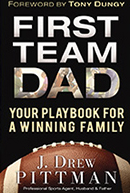
After a strong of scandals, some speculate that the NFL has become a haven for violent men. But one Christian NFL sports agent says that the problem isn’t limited to sports and is bigger than domestic violence. – Image courtesy of Parker Anderson (http://bit.ly/11dPidT)
Another day, another football player arrested for domestic violence.
Frank Clark, a senior defensive end for the University of Michigan, was arrested Sunday for allegedly attacking his girlfriend in a Perkins, Ohio hotel room. Sports analysts predict Clark will be a third-round NFL draft pick next year. It’s the latest in a string of scandals involving football players this year–including Baltimore Ravens’ Ray Rice and Minnesota Vikings’ Adrian Peterson–that has prompted the NFL to implement a revamped domestic violence policy.
But Drew Pittman, a Christian NFL sports agent whose firm has negotiated almost $1 billion in player contracts, claims we’re missing the real problem. He says America–not just sports–is experiencing an epidemic of men who are not equipped to be husbands and fathers. He’s compiled stories and principles from his career in a new book, First Team Dad: Your Playbook for a Winning Family (foreword by Super Bowl winning coach Tony Dungy), and argues that our real problem is ungodly men. Here we discuss his book, sports scandals, and what he believes every parent can learn about parenting and marriage from professional sports.
RNS: All the scandals association with the National Football League lately make people wonder if there is a family crisis among those in the organization. What do you say?
DP: [tweetable]The domestic violence problem is not an NFL problem, it’s a societal problem.[/tweetable] One in four women will suffer violence at the hand of their spouse or boyfriend. When it involves an NFL player, it makes the news. But there is a crisis in our country, and the world really, with men behaving poorly. There are too many fatherless homes and too many homes where the dad has not been taught how to be a real man, a godly man, so the problem is perpetuated. If we can make the NFL a place where these high profile men are ambassadors for men behaving well, we can have a very positive affect on society.
RNS: I’ve heard people say they think that playing football makes a person more aggressive, and maybe that is why we find domestic abuse cases within the NFL. How do you react?
DP: I think that is a reasonable assumption, but not necessarily reality. I know many NFL players who are tough and strong on the field and kind, humble, and gentle off the field. [tweetable]Issues arise when any man in any profession doesn’t know how to deal with his emotions.[/tweetable] When men are not taught how to deal with fear, anger, bitterness, etc in a healthy way and haven’t had that modeled for them by the men in their lives, they tend to not deal with it properly. If a man gets angry and it turns to violence that is because it is what he knows. This is not an occupational issue or even a socioeconomic issue. It is immune to age, race, religion. It is an issue with men not understanding how to be real, loving, godly men. [tweetable]The enemy has is tearing down our country by attacking the home.[/tweetable] It didn’t get this way overnight, and it won’t be fixed overnight. But it can be fixed.
RNS: What have you learned about being a husband from working as a professional NFL sports agent?
DP: A few years ago, I was praying about becoming a better husband, and I kept coming back to these lessons I learned from playing sports and being an NFL agent. For example, the importance of culture in the success of a team applies to the culture I build in my home. I had a situation with a few clients that showed me how their success on the field was tied so closely to their unselfishness and how that was a key to me being a better husband. I wrote down 30 principles from my industry that radically changed my marriage and family, and that is how First Team Dad became a book.
RNS: And what about being a father. Have you learned anything about parenting from your profession?
DP: Sports teach great lessons about teamwork, leadership, overcoming adversity, and working towards a common goal. These are principals that are helping me be a better dad. I need to model these principals for my boys, and I need to teach them the importance of these principles to being successful as future dads themselves.
RNS: If you could give one piece of advice to parents raising a child-athlete, what would you say?
DP: I’ve coached soccer, basketball, and flag football. So many parents ride their kids so hard because they want them to do their best and to use all their God-given talent. They want their kids to learn how to give great effort. But too often they are living vicariously through their kids. They think their kid’s success or failure somehow reflects on them. It puts massive pressure on their kids and often times creates an opposite affect of what they are trying to accomplish. I used to tell the parents of my teams, after the game on the drive home, don’t talk about the mistakes or even the great plays. Just tell them how much you love watching them play. Period. Most kids–no matter how good they are–will not play college or professional sports. Don’t make them feel your love is conditional on how they play; just tell them you love watching them.






